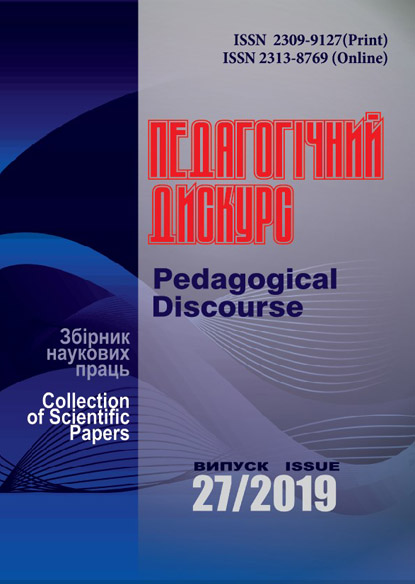Analysis of Approaches and Teaching Tools in Maritime Educational Institutions Abroad
Abstract
The article analyzes the current state of maritime education abroad. The study on the training of maritime specialists abroad is analyzed and the conclusion is made that the issue of research on approaches and means of training in maritime educational institutions abroad, aimed at improving the efficiency of maritime education, is not adequately covered. The importance of such international institutes as the International Association of Maritime Universities and the International Maritime University in improving the professional training of future maritime professionals is highlighted. It is revealed that the International Association of Maritime Universities is paying attention to the problems of the impact of virtual reality on maritime education and training, including the coverage of how to apply virtual reality in the training of maritime professionals. It is determined that the main content of the educational programs of the International Maritime University is the educational and research problems. Studies on the challenges of improving the training of maritime professionals in developing countries (South Africa, Vietnam) are analyzed. Some recommendations that may be appropriate for introducing Ukraine’s maritime education as a country undergoing a process of reforming the national education system are presented. Methods such as analysis, synthesis, comparison, generalization were used to achieve the goal. It has been established that the emphasis is on developing the digital skills of future maritime professionals and implementing the requirements of the 4th Industrial Revolution into maritime education and training. It is determined that to improve the professional training of future maritime specialists in Ukraine such approaches as interdisciplinary, dual, informative, research, integrative, as well as the principle of mobility can be used. As the result, virtual and augmented reality, mobile technologies and distance learning are identified as effective learning tools.
Downloads
References
About IAMU. Retrieved from: https://iamu-edu.org/about-iamu [in English].
Emad, G., & Roth, W. M. (2008). Contradictions in the Practices of Training for and Assessment of Competency. Education Training, 50 (3), 260–272. doi: https://doi.org/10.1108/00400910810874026 [in English].
International Association of Maritime Universities. (2004). International Association of Maritime Universities Annual General Assembly no 5, 2004: Advances in International Maritime Research [in English].
International Maritime Organization. (2017). STCW: Including 2010 Manila Amendments: STCW Convention and STCW Code: International Convention on Standards of Training, Certification and Watchkeeping for Seafarers. London [in English].
Members. Retrieved from https://iamu-edu.org/about-iamu/members [in English].
MSc and Phd in Maritime Affairs Taught in Malmo. Academic Handbook. Retrieved from https://www.wmu.se/sites/default/files/documents/files/WMU-Academic-Handbook-2018-Online_0.pdf [in English].
Ngcobo, L. A. (2018). Response to Technology Advancement in Maritime Education and Training: a Case Study of the South African National Maritime Institutes. (MSc dissertation). Malmö: World Maritime University [in English].
Redefining Seafaring Pedagogy – Impacts of Virtual Reality on Maritime Education and Training. Retrieved from https://iamu-edu.org/download/final-report-of-research-project-fy2017 [in English].
Tran, T. N. M. (2018). Integrating Requirements of Industry 4.0 into Maritime Education and Training: Case Study of Vietnam. (MSc dissertation). Malmö: World Maritime University [in English].
Efentyev, V. P. (2005). Teoriya i praktika upravleniya kachestvom neprery’vnoj professional’noj podgotovki morskix specialistov v akademicheskom komplekse [The Theory and Practice of Quality Management of Continuing Professional Training of Maritime Specialists in the Academic Complex]. (Extended abstract of Doctor’s thesis). Kaliningrad [in Russian].
Kosty’lev, I. I. & Ovsyannikov, M. K. (2015). Morskoye obrazovaniye v mezhdunarodnoj industrii. [Maritime Education in International Industry]. Vy’shee obrazovaniye segodnya – Higher Education Today, 5, 24–28 [in Russian].
Kosharskaya, L. V., Brednyova, V. P. & Levitscy, A. O problemax otechestvennogo i zarubezhnogo morskogo obrazovaniya [About Problems of Domestic and Foreign Marine Education]. Visnyk Odeskoho Natsionalnoho Morskoho Universytetu – Bulletin of Odesa National Maritime University. Retrieved from http://mx.ogasa.org.ua/handle/123456789/7631 [in Russian].
Makarenko, M. V., Nosovska O. B., & Kravchenko A. V. (2017). Riven profesiinoi pidhotovky moriakiv torhovelnoho flotu yak holovnyi chynnyk znyzhennia avariinosti na mori [The Level of Professional Training of Seamen of the Merchant Fleet as the Main Factor in Reducing the Accident Rate at Sea]. Visnyk Pryazovskoho Derzhavnoho Tekhnichnoho Universytetu – Bulletin of the Pryazovia State Technical University, 34, 259–266 [in Ukrainian].
Popova, H. V. (2019). Symuliatsiini tekhnolohii zmishanoi realnosti u pidhotovtsi maibutnikh sudnovodiiv [Mixed Reality Simulation Technologies in the Preparation of Future Navigators]. Naukovyi ohliad – Scientific Review, 6 (59), 103–110 [in Ukrainian].
Riabukha, I. M. (2019). Vplyv rehuliatornykh aktiv Yevropeiskoho Soiuzu na rozvytok ukrainskoi systemy morskoi osvity (kinets ХХ – pochatok ХХІ stolittia) [Influence of Regulatory Acts of the European Union on the Development of Ukrainian Maritime Education System (End of the 20th – Beginning of the 21st Century)]. Pedahohichni nauky – Pedagogical sciences, LXXXVI, 78–82 [in Ukrainian].
Yurzhenko, A. Yu. (2019). Eksperymentalna perevirka efektyvnosti modeli formuvannia komunikatyvnoi kompetentnosti v systemi profesiinoi pidhotovky maibutnikh sudnovykh mekhanikiv [Experimental Verification of the Effectiveness of the Model of Communicative Competence Formation in the System of Training of Future Ship Engineers]. Innovatsiina pedahohika – Innovative Pedagogy, 9 (3), 107–109 [in Ukrainian].
Copyright (c) 2019 Pedagogical Discourse

This work is licensed under a Creative Commons Attribution-NonCommercial-ShareAlike 4.0 International License.

















